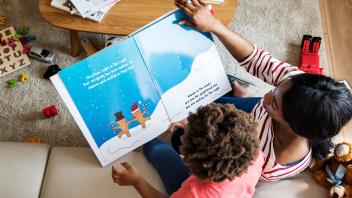When sharing stories with your child, make the time together special, simple, short and sweet.
Special
Set aside a regular time when you and your child enjoy reading together. Children love this special attention.
- Pick a comfortable, quiet spot where there will be no distractions.
- Sit together so you both can share the book.
Simple
Start looking through picture books with infants and toddlers. Point to and name things in the pictures together. Preschool children like to pick books themselves. As children grow older, they may enjoy reading many kinds of materials: stories, poems, riddles, plays, books, comics and magazines about their interests.
When reading to your child:
- Read slowly and with feeling.
- Change your voice to match the story line and characters.
- If there are too many words for you or your child, just tell a story to go with the pictures.
Short
Begin reading to toddlers and preschoolers for about 5-10 minutes. Stop reading before your child loses interest. As your child’s attention span grows, you can read for a longer time. You may want to read with your school-age child as long as your child likes.
Sweet
Always keep your book and story sharing fun. It’s the love of books that helps children become good readers.
You don’t have to be the only storyteller. Ask grandparents, older children, baby-sitters, visiting friends and relatives. You can also take your child to story hours at the library. Encourage young children to make books a part of their playtime-to tell stories to you, to themselves, and to their friends, favorite dolls, stuffed animals or even pets.
Other suggestions
- Give gifts
Let your child see you give someone a book as a special gift. Give your child a book or magazine subscription as a gift. Have your child give books as birthday presents.
- Write notes
Write little notes to your children when are going out or they are going to school. Hang them in the kitchen, put them on their pillows or in their school lunches.
- Encourage journal writing
Older children might like to keep a journal or a diary for their private thoughts.
